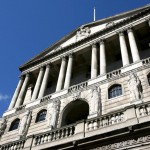UPDATE 31st July 2012 – This article relates to July 2012. Click here for the latest interest rate predictions
So when will interest rates go up?
The market’s view is that interest rates will start to rise in the final quarter of 2016. To put this into context, in September the market's view centred around mid 2012 . And just last month the market consensus was for the first rate rise to be in early 2016.
But why is a rate rise looking less likely?
- NO official support for a rate rise – last month the Bank of England’s Monetary Policy Committee (MPC), who are the guys who decide the UK base rate, once again voted to keep the base rate at 0.5%, for the 39th month in a row.
- But a cut in the bank base rate is possible! - the Committee actually discussed the possibility of cutting the base rate to just 0.25%. Such is the level of concern over the UK economy that even the head of the International Monetary Fund called for the Bank of England to not only print more money but also to cut interest rates further. Markets reacted to all this by pricing in a possible rate cut by the end of the year.
- Inflation remains high yet fell – to 2.8% in May from 3% in April. But high inflation could derail an economic recovery. To combat inflation interest rates are usually increased. Although inflation remains stubbornly high it is expected to fall further in 2012, and back under the Bank of England's 2% target in 2013.
- The UK economy is back in recession – With the UK economy in a bad way (high unemployment etc) increasing rates could tip personal finances over the edge and spell disaster. Especially as nearly half of home owners are living in fear of a rate rise. This will deter the MPC from raising rates especially as economists expect the economy to contract further in the coming months due to the various bank holidays. But rather than a rate rise even more Money Printing (aka Quantitative Easing) by the Bank of England is almost certain this month, as much as £50 billion worth. To fund out how this will affect you read my article - Quantitative Easing explained and how it could affect you.
- Unemployment fell – The number of UK unemployed fell for the third time in a year to 2.61 million and the unemployment rate sits at 8.2%. In theory a stable growing economy, will keep a lid on unemployment, and be more conducive to a rise in interest rates.
- Any signs of green shoots? – As the UK GDP figures disappointed there was little sign of any green shoots emerging, in fact the original estimate for the level of economic contraction was downgraded even more, as was the final Q4 figure for 2011. The UK services sector (a key driver of the UK economy) slowed in April along with the manufacturing and construction sectors. The latest surveys of the manufacturing and construction sectors have shown confidence is continuing to collapse. But in a rare glimmer of sunshine retail sales rebounded in June, thanks to the Queen's diamond junilee, but they were still below par for this time of year.
- UK Economic growth forecasts continue to be cut – be it the British Chamber of Commerce or the Bank of England themselves. Raising rates would hammer consumers further and could derail any sniff of an economic recovery which would be bad news.
- Mervyn King doesn't want to raise rates – Mervyn King is the guy who heads up the group of people who set the bank base rate. Mervyn has previously said that there would be no rise in interest rates until there was clearer evidence that the economy was growing and that unemployment and the interest rates actually paid by consumers were falling. None of these will be happening any time soon and the MPC has come under criticism from an ex-member for forming a 'consensus' of opinion around Mervyn King.
So should you rush to fix your mortgage now why rates are low?
Luckily I’ve answered this question in my article Should you fix your mortgage now? But if you want more help then you can click on the button below.





